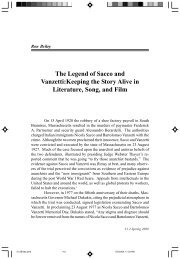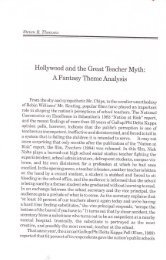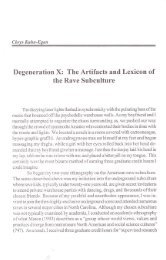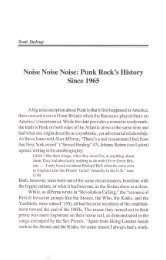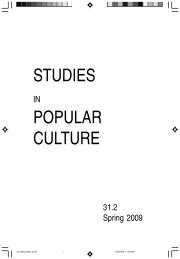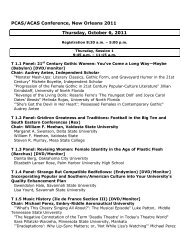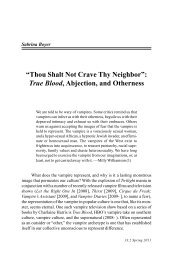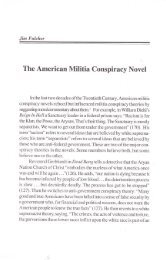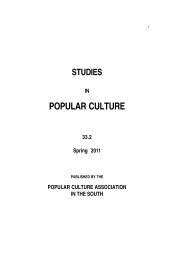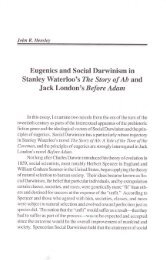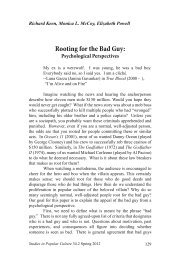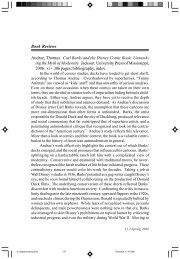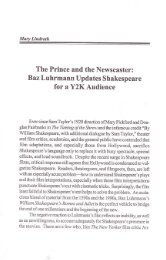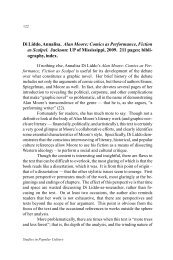Adapting Shakespeare for Star Trek and Star Trek for Shakespeare ...
Adapting Shakespeare for Star Trek and Star Trek for Shakespeare ...
Adapting Shakespeare for Star Trek and Star Trek for Shakespeare ...
You also want an ePaper? Increase the reach of your titles
YUMPU automatically turns print PDFs into web optimized ePapers that Google loves.
The Klingon Hamlet <strong>and</strong> the Spaces of Translation 49<br />
Klingon restored version” of Much Ado About Nothing, appear to be alluding<br />
to the spaces of difference <strong>and</strong> alienation governing the process of<br />
translation.<br />
In Blanchot’s words, translation is “the very life” of the difference<br />
between the languages, <strong>and</strong> the translator, its “secret master.” 41 He or she<br />
reveals the <strong>for</strong>eignness of two languages: the language of the original <strong>and</strong><br />
the language of its translation, the language of the author <strong>and</strong> his or her own<br />
language. In doing so, the translator makes visible “what makes this work<br />
such that it will always be other.” 42 This interplay between the self <strong>and</strong> the<br />
other, between one’s own meaning <strong>and</strong> the other’s, is a paramount feature<br />
of translation, which should never be perceived as an achieved work, but<br />
rather as a trace: a trace of history, a cultural trace, but most of all a trace<br />
of the other. For a translation can only, <strong>and</strong> only perhaps, be realized in “the<br />
possibility of anterior presence, without guarantees” of the other <strong>and</strong> his/<br />
her meaning. 43 This meaning is to be found in “a trace” of the other, which<br />
is never the same as “a sign,” <strong>and</strong> this terminological turn suggests how<br />
fleeting <strong>and</strong> ungraspable that meaning is. Of course, in view of Lévinas’<br />
writings, it must remain such if we are still to speak of the relation of<br />
<strong>for</strong>eignness or otherness. To look into the <strong>for</strong>ms of the other <strong>and</strong> find oneself<br />
is to equate him or her with the self, “[t]o translate the neighbour is to<br />
turn him/her/it into a category of our own language <strong>and</strong> so to deny him/her/<br />
it otherness.” 44 Translation is there<strong>for</strong>e always <strong>and</strong> inevitably also alienation.<br />
“What I translate is upset by the way I translate,” exclaims Lévinas,<br />
indicating how this process affects those who could never be understood. 45<br />
Paul de Man reminds us that “this alienation is at its strongest in our relation<br />
to our own language,” its meaning stripped of its familiarity through the<br />
comparison with the <strong>for</strong>eign. 46 To translate is to alienate both the other <strong>and</strong><br />
the self.<br />
The Klingon versions of <strong>Shakespeare</strong>’s works seem to recall some of<br />
those arguments. In those texts a reader is confronted with several essential<br />
questions. Whose meaning is enacted in those translations? Whose otherness<br />
is emphasized? Whose language is alienated? In brief, who is “the<br />
other” in this particular “cultural translation”? The Klingon translations seem<br />
to offer several possible answers to this important issue, giving evidence of<br />
the complex play of alien-ness <strong>and</strong> othering enacted in these projects. The<br />
first <strong>and</strong> most obvious answer is that the other is in this case to be identified<br />
with an alien in its most literal sense: as an imaginary, warlike, nonhuman<br />
32.2 Spring 2010



